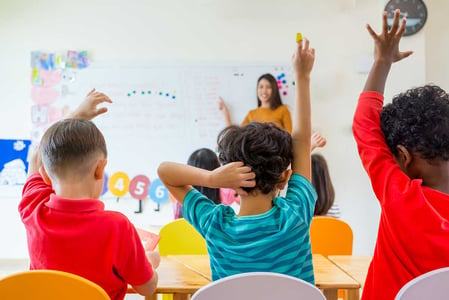
Welcome to our newest blog series dedicated to the research we're reading and thinking about.
Remember the old Lay's Potato Chip advertising campaign, "Bet you can't eat just one?" Whether we’re talking about potato chips, staying on task at work, or working towards a goal, self-regulation is essential—and challenging! But what about for kindergartners? What’s the value of self-regulation when it comes to the major transition into elementary school? That’s one of the questions that a group of researchers posed in a 2009 Developmental Psychology paper.
Using a group of 172 kindergarteners from rural, lower-income areas, researchers examined the extent to which baseline self-regulation skills related to students’ self-control, positive work habits, and engagement. They also looked at the relationship between classroom quality (in this case, CLASS scores) and these outcomes. In the fall, researchers gathered data on students’ incoming self-regulation skills. Then, over the school year, they conducted CLASS observations, rated engagement, and asked teachers to rate students’ adaptive classroom behaviors; things like staying on task during challenging activities, taking turns speaking, (not) getting into fights, and working toward goals.
If you’ve worked with young kids, you won’t be surprised to learn the first result. Children with greater self-regulation when they entered kindergarten were rated higher by their teachers on behavioral self-control and work habits at the end of the school year. Basically, incoming self-management leads to even more self-management, even in an unfamiliar situation. What’s more, children who had enrolled in preschool the previous year outscored their new-to-school peers in all five areas of adaptive classroom behaviors measured by researchers (behavioral self-control, cognitive self-control, positive work habits, time off task, and engagement in learning).
Classroom quality also predicted these outcomes. Better classroom management (i.e., Behavior Management, Productivity, and Instructional Learning Formats) was related to substantially more engagement in learning, less time off task, and higher behavioral self-control. For example, a one-point increase in classroom management linked to 21.76 fewer seconds off-task (in a 10-minute observation window). That’s like getting an additional 4% of your learning day! The benefits of a well-managed classroom were similar for all children in a classroom, regardless of their incoming self-regulation skills.
This study tells an important story. First, the self-regulation skills children bring with them to kindergarten are pretty important for their social-emotional adjustment into the elementary school setting—skills beget skills. Second, regardless of students’ incoming self-regulation ability, kindergarten teachers can make a difference in developing adaptive classroom behaviors by using varied learning strategies, increasing productivity, and being proactive with behavior management. So, it may pay off to help young children learn how to “have just one!”
Citation: Rimm-Kaufman, S.E., Curby, T. W., Grimm, K.J., Nathanson, L., & Brock, L.L. (2009). The contribution of children's self-regulation and classroom quality to children's adaptive behaviors in the kindergarten classroom. Developmental Psychology, 45 (4), 958-972.

